SAN JUAN, P.R. — Hundreds of thousands of people swept through the capital of Puerto Rico on Monday, shutting down a major highway and paralyzing much of the city in the latest in a series of furious protests over the island’s embattled governor, Ricardo A. Rosselló.
The protest was one of the largest ever seen on the island, as Puerto Ricans streamed into the capital on buses — and some on planes from the mainland — in a spontaneous eruption of fury over the years of recession, mismanagement, natural disaster and corruption that have fueled a recent exodus.
Ignoring sporadic deluges, demonstrators launched impromptu line dances, paraded on horseback, banged pots and carried banners along several miles of highway, many shouting: “Ricky, renuncia, el pueblo te repudia!” — Ricky, resign, the people reject you.
Mr. Rosselló said on Sunday that he would step down from the leadership of his party and pledged not to run for re-election in 2020. But the governor, a 40-year-old former biomedical scientist and businessman, is growing increasingly isolated as a series of influential political leaders, some from his own party, have called on him to accede to public demands for an immediate resignation.
“Governor, Puerto Rico Demands Your Resignation,” the island’s largest-circulation daily newspaper, El Nuevo Día, said in an unusual front-page editorial on Monday.
The newspaper, citing an analysis by a geographer, said more than 500,000 people attended Monday’s protest, which later in the day moved from the highway to the area outside the governor’s residence. The organizers had not yet cited an attendance estimate, and the police said they did not plan to offer one.
President Trump, who has frequently been at odds with Mr. Rosselló, a Democrat, over federal hurricane recovery aid, weighed in on the protests. “You have totally grossly incompetent leadership at the top of Puerto Rico,” the president told reporters at the White House. “The leadership is corrupt and incompetent.”
The crisis has deepened an existential wound that has long been festering in Puerto Rico, an island of 3.2 million people that is a territory of the United States with neither official voting representation in Congress nor a vote in presidential elections. Hundreds of thousands of people have left in the past decade, as those who remained suffered through unemployment, hurricanes, economic restructuring and government-imposed austerity measures. Nearly half of those left on the island live in poverty.
“People are tired already,” said Ashley Santiago, 28, whose home in the eastern city of Yabucoa was without power for nine months after Hurricane Maria hit in 2017. Then her son’s neighborhood school became
one of hundreds across the island that closed, victims of the debt crisis, population flight and a transition to charter schools.
“There’s an indignation that they walk all over you day after day,” said Ms. Santiago, who supports the protests. “They are up there making decisions and don’t see the domino effect the things they do have on the people. The people can’t take it anymore.”
The long-simmering unrest erupted earlier this month when Puerto Rico’s
Center for Investigative Journalism published nearly 900 pages of transcripts of Telegram messaging app chats involving Mr. Rosselló and 11 of his friends and advisers, all of whom are men. The exchanges revealed an arrogant “bro” culture of elites who joked about making chumps out of even their own supporters. They ridiculed an obese man, a poor man, a gay pop star and several women.
In recent days, Puerto Ricans have used a variety of phrases to explain the effect the revelation of the crass messages has had on Puerto Ricans of all stripes: The last drop that overflowed the glass. The straw that broke the back of the Puerto Rican camel.
“It’s all connected,” said Dimaris Traverso, who joined the protests in San Juan. “From a bad government, to poor performance — it all connects.”
Ms. Traverso has been trying to get answers from the government about the death of her 23-year-old son from unexplained causes. But his body has been held up at the short-staffed morgue in San Juan for four weeks — in line for an autopsy, awaiting official identification, unable even to be buried. “Do you think it’s easy to be here with these picket signs?” Ms. Traverso said. “Do you think we had to resort to this?”
In an interview with Fox News on Monday, Mr. Rossello said he had apologized to some of those named in the chat but still has work to do as governor.
“I have made a decision; I’m not going to run,” he said. “I’m not going to seek re-election. And that way I can focus on the job at hand.”
“You know,” he added, “I’ve had the biggest recovery effort in the modern history of the United States on our hands. We’re battling corruption with certain initiatives that we’ve already started and certain new ones that we want to put out there so that we can fix the problem.”
Many Puerto Ricans see this crisis as an opportunity to rethink the difficult status quo. A fiscal control board designated by Congress has been calling many of the shots in recent years, forcing the island through strict austerity measures to manage a crippling debt crisis that caused it to declare a form of bankruptcy two years ago. Although the people and their placards are unlikely to change that, many experts here say that the protests could lead to a seismic shift in the domestic power structure, which has long been controlled by two political parties.
Puerto Rican politics have long been dominated by the governor’s New Progressive Party, which supports statehood for Puerto Rico, and the Popular Democratic Party, which favors an enhanced version of the current commonwealth status. The governor’s party controls both chambers of the legislature, but most protesters are fed up with both parties.
“There aren’t two parties, there is just one, the P.L.P.: the Party of Lining Your Pockets,” said Nelson Denis, the author of a book, “War Against All Puerto Ricans,” about a 1950 revolution in Puerto Rico and the long history of American intervention on the island.
Mr. Denis said the current push for change is not only over which politicians are in charge, but also what laws govern Puerto Rico’s relationship with the mainland. One of the chief targets is the 1920 Jones Act, which specifies that only ships built, owned and operated by United States citizens or permanent residents can bring goods to Puerto Rico. The law is cited as one of the main reasons goods generally cost much more in Puerto Rico.
“People get in a lather over this chat when hundreds of thousands should be marching over the Jones Act and structural issues that makes a car cost $6,000 more than it does in Miami,” Mr. Denis said.
Carmen Yulín Cruz, the mayor of San Juan and a member of the Popular Democratic Party, said Puerto Rico faces the possibility of significant political change for the first time in years.
“It’s not that we want to blow up the system,” she said. “It is that the system has imploded.”
Ms. Cruz, whose battles with Mr. Trump after Hurricane Maria made her an international celebrity, said she plans to run for governor next year. “We have to take this opportunity to look at the larger picture and see how we ended up with some of those vices of democracy that make those who have more think they deserve more, and those that have less continue to have less,” she said in an interview. “We are writing a different kind of history.”
Luis Vega Ramos, a legislator in Ms. Cruz’s Popular Democratic Party, said many of the measures he proposed in the past that never made it out of committee could now see new life as a result of the political tumult. Among the reforms he said are needed are campaign finance transparency, direct election of the lieutenant governor and the adoption of rules allowing Puerto Ricans to conduct citizen initiatives and recall referendums. Lacking runoff elections, he noted, Puerto Rico is now governed by a man who won just 42 percent of the vote.
“That means 58 percent voted against him,” Mr. Vega said. “People are fed up with a system they believe favors those who are close to certain candidates who are willing to engage in pay-to-play schemes. We have had corruption and ineptitude before. This is organized crime with bratty indolence.”
It is still not clear what effect the current crisis will have on the governor’s quest to make Puerto Rico a state, although it is unlikely to help. The issue has long been a divisive one on the island, where people enjoy the benefits of American citizenship but cling to their own Spanish-speaking culture.
In a 2012 vote, 54 percent of Puerto Ricans rejected the current territorial status, but they were divided on what to do as an alternative. The vast majority signaled support for statehood, but the vote on that issue wasn’t given much credence because so many statehood opponents and others boycotted the question.
“Island residents have felt for some years now that the current territorial status isn’t working anymore,” said Luis Fortuño, a former governor. “Said political status used to be promoted as the best of both worlds. Now it’s definitely the worst of both worlds.”
He acknowledged that statehood will take a back seat to the present domestic political turmoil.
“The current crisis trumps all other issues,” he said. “The claims for equal rights and obligations of the over 3 million Americans residing in Puerto Rico will not go away.”
Tamara López’s 9-year-old daughter, Libertad, died of a pulmonary disease on Sept. 20, 2017 — the day Hurricane Maria struck and health care services across the island were paralyzed. She said Puerto Ricans were ready to build a new government.
Ms. López and a handful of other women gathered under an unforgiving sun this weekend beside several pairs of used shoes arranged in a circle. A Nike sneaker supported a Puerto Rican flag. Each tattered sandal and battered sneaker once belonged to someone who perished in the chaotic days after the hurricane, when the government lacked a cohesive emergency response plan and hospitals were plunged into darkness.
She will never know whether her daughter died of natural causes, or because the government failed to require hospitals to have generators that could power life-sustaining equipment, she said.
“They used that slogan, ‘Puerto Rico Rises.’ What did it rise for? For corruption and for them to steal millions from the health department and schools?” she said, referring to recent federal indictments in those sectors.
“We went through the worst. We did not rise up for this. We rose up to build a new country,” she said. “Now, this is what we are building.”










